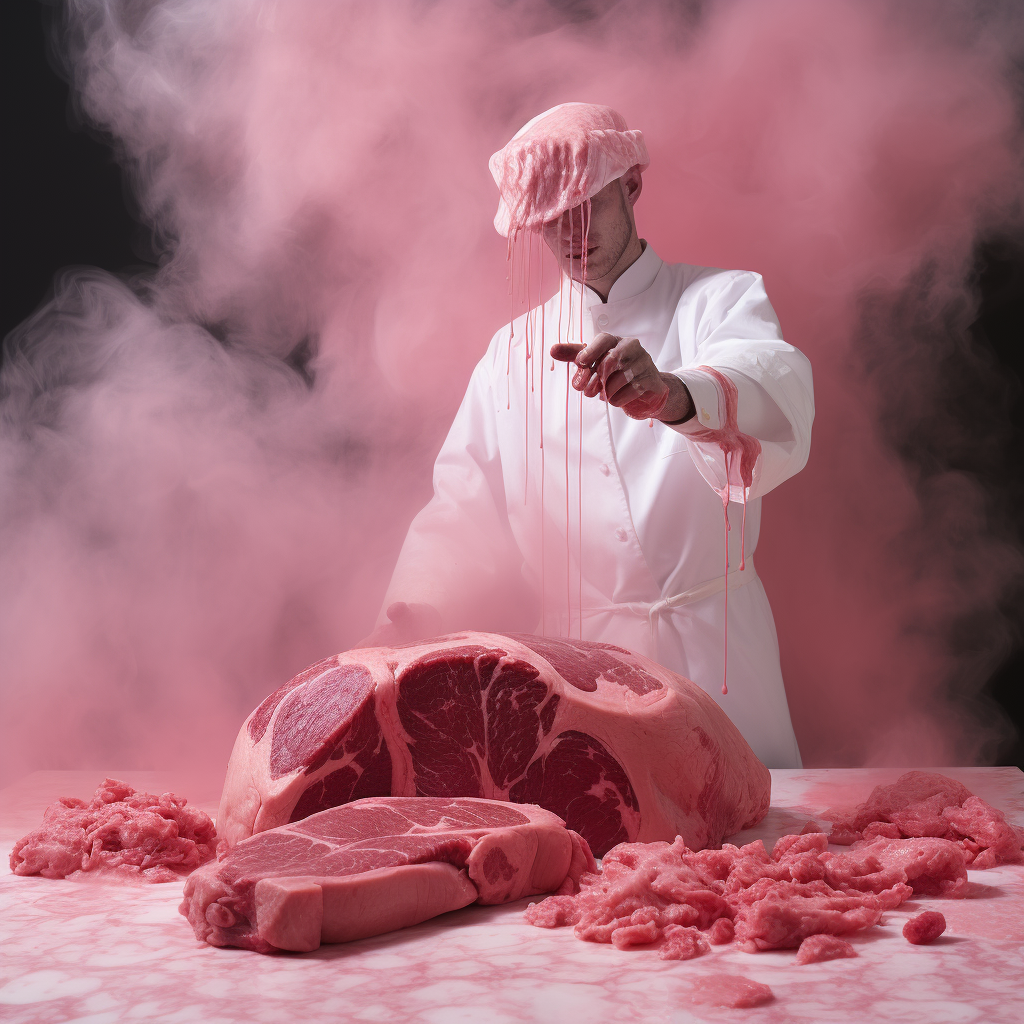Welcome to the charred truth about meat – a journey that delves deeper than the surface sear, uncovering the layers that many carnivores have never dared to explore.
The gentle hum of the aircraft’s engines tapered off as it began its descent. It was 17th June 2078. The cabin lights dimmed, and the overhead announcement chimed in, “Ladies and gentlemen, this is your captain speaking. We are about to land in Lisbon, Portugal. Local time is 6:45 pm. We hope you had a pleasant flight.”
As passengers rustled about, adjusting their seats and peering out of the windows, Uri, a keen-eyed Israeli in his early thirties, stared intently at the sprawling city below, his thoughts far from the runway. He mused about the tantalising prospect that brought him here – a special meal. Not just any meal, but a genuine steak, an authentic slice of meat in a world that had long forsaken it for 3D-printed alternatives.

As Uri’s taxi weaved its way from the airport, he was immediately struck by the futuristic landscape of Lisbon. The city shimmered under a luminescent canopy, with towering holographic billboards showcasing the latest in entertainment and technology. The streets were not just filled with cars; they were alive with them. AI-driven vehicles moved in orchestrated precision, communicating silently to avoid collisions and ensure a smooth flow.
Drones of varying sizes flitted above, some delivering parcels while others projected advertisements into the sky, their light shows reflecting in the mirrored facades of the skyscrapers. Sidewalks were populated by pedestrians wearing augmented reality glasses, their gestures indicating interactions with a digital world overlaying the physical.
The River Tagus sparkled under the city lights, with autonomous boats gliding silently across its surface, leaving luminescent trails in their wake. Historic structures had been preserved but now stood juxtaposed against new-age designs, creating a harmonious blend of old-world charm and new-world innovation.
Uri pressed his face closer to the taxi window, captivated by this blend of history and futurism. Every corner of the city hinted at stories waiting to be discovered, and atop his list was the tale of the forbidden steak.
As the cityscape whizzed by, Uri’s curiosity bubbled over. Hesitating for just a moment, he cleared his throat and began a conversation with the AI taxi interface, a screen embedded in the seat in front of him that displayed a friendly, animated face.
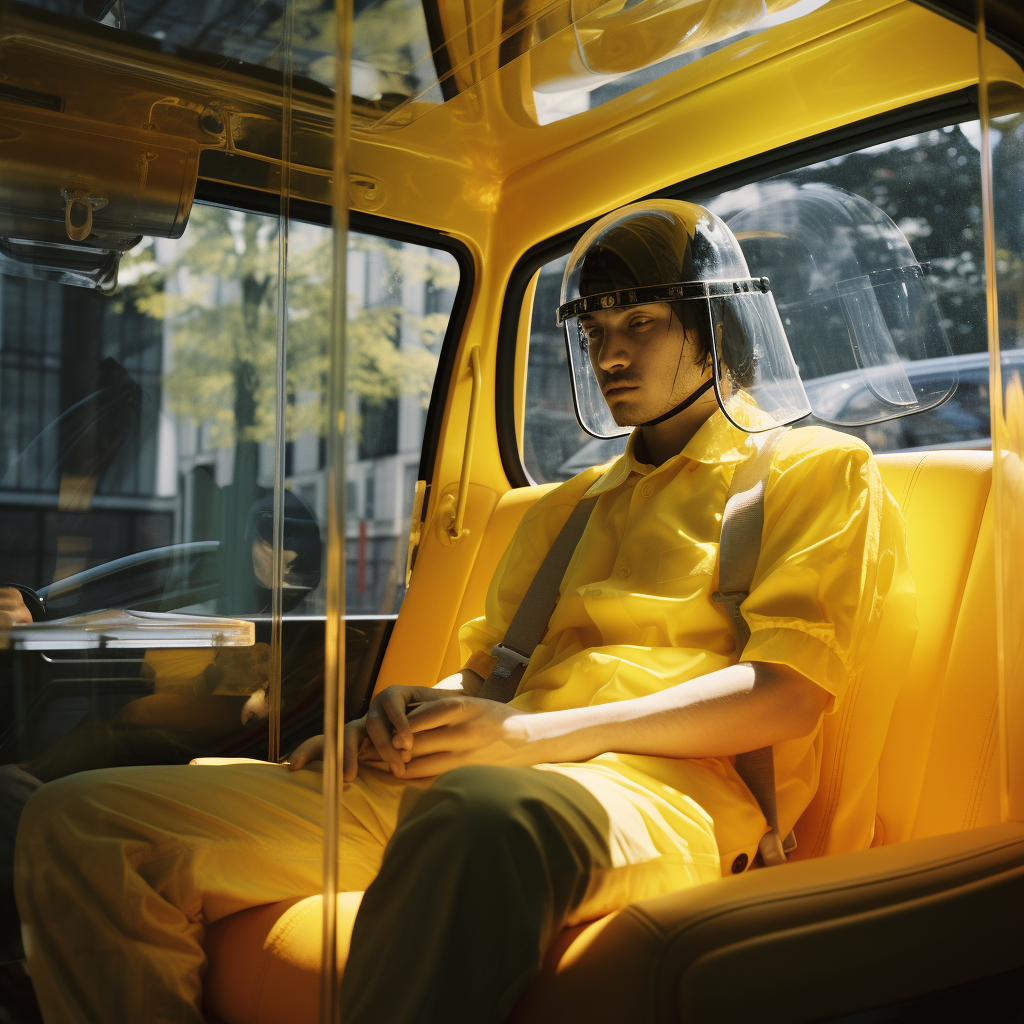
“Hey, I’ve heard some rumours about… well, real steaks being available in Lisbon. Is that true?”
The AI face animatedly blinked, processing his question for a split second before replying with a cheerful yet neutral tone, “Ah, sir! Consuming real meat has been discouraged for decades due to health, ethical, and environmental concerns. The production of genuine meat is not only harmful to our ecosystem but also poses various health risks. Most establishments serve lab-grown or 3D-printed alternatives which are both eco-friendly and health-conscious.”
Uri prodded further, trying to gauge if there was more beneath the programmed response, “But what if someone wanted to, you know, experience it? Are there places in Lisbon where one might… indulge?”
The AI’s facial expression remained amiable, but its voice took on a more cautionary tone, “I must stress that it’s illegal to sell or consume real meat. Besides, with the advancements in food technology, 3D-printed steaks have been engineered to mimic the taste, texture, and nutritional value of real meat without the associated drawbacks. It’s a safer, more sustainable choice.”
Uri leaned back, slightly disappointed at the AI’s by-the-book response. But deep down, he hadn’t expected the taxi to be a source of underground information. Still, the very fact that the AI was programmed to respond in such a detailed manner only fuelled his intrigue further. He was convinced that somewhere in this city of the future, there was a past waiting to be tasted.
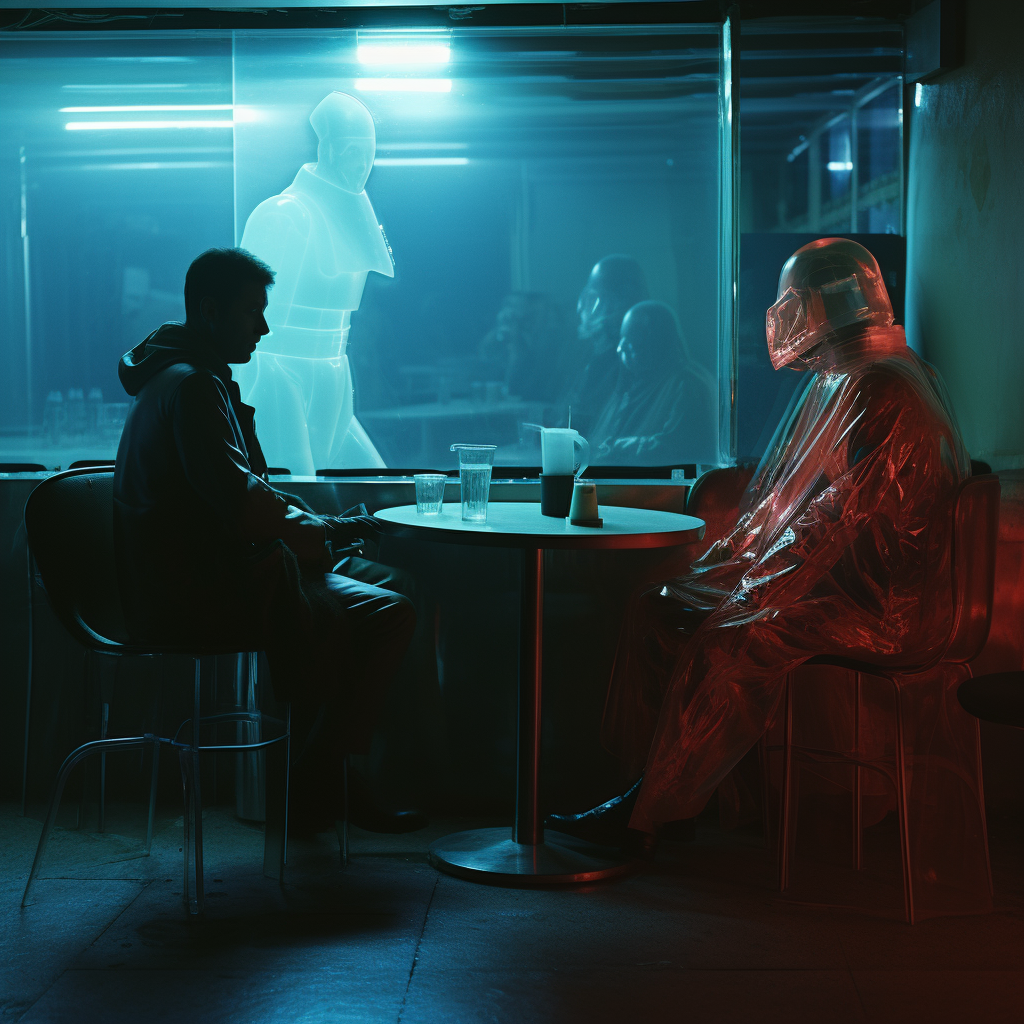
Inside Uri’s mind, a whirlwind of thoughts threatened to engulf him. Am I being naive? What if the AI reports these conversations? They’ve probably got algorithms to detect suspicious inquiries. Heck, for all I know, there might be a list somewhere of people asking too many questions about real meat. And the last thing I need is to be flagged and monitored by the authorities.
He recalled stories of people who’d been caught in the web of AI surveillance for far less. The future was a time of unparalleled technological marvels, but it was also an era where privacy was a relic, a thing of the past.
Shouldn’t have brought it up. But if the whispers are true, there must be others who’ve inquired. Surely, I can’t be the only one chasing this legend? Uri pondered, hoping to console himself.
The animated face of the AI seemed to look back at him innocently, but Uri couldn’t shake off the paranoia gnawing at him. They’ve made it so easy to ask and learn, but at what cost? Everything is recorded, remembered, analysed.
He decided to play it safe, leaning forward, forcing a chuckle, “You know, I was only joking about the real meat. It’s just something a friend mentioned as a joke, and I thought I’d play along. Obviously, I agree with you. Real meat is outdated, and it’s good we’ve moved past it.”
The AI blinked, its face as neutral as ever. “Of course, sir. It’s always good to be informed and make eco-friendly and healthy choices.”
Uri leaned back in his seat, relieved at having potentially defused any alarms he might have inadvertently triggered. But underneath that facade of relief was a determination that burned even brighter — he would find that steak, but he’d have to be far more discreet in his search.
***
Uri’s week in Lisbon turned out to be a curious blend of adventure and caution. The sprawling city, with its magnificent mix of futuristic architecture and quaint European charm, was teeming with life, both digital and organic. The days of easily distinguishing between man and machine were long gone. Now, digital beings, with their highly sophisticated interfaces and ability to inhabit humanesque bodies, mingled effortlessly among the crowds, often for their own amusement.
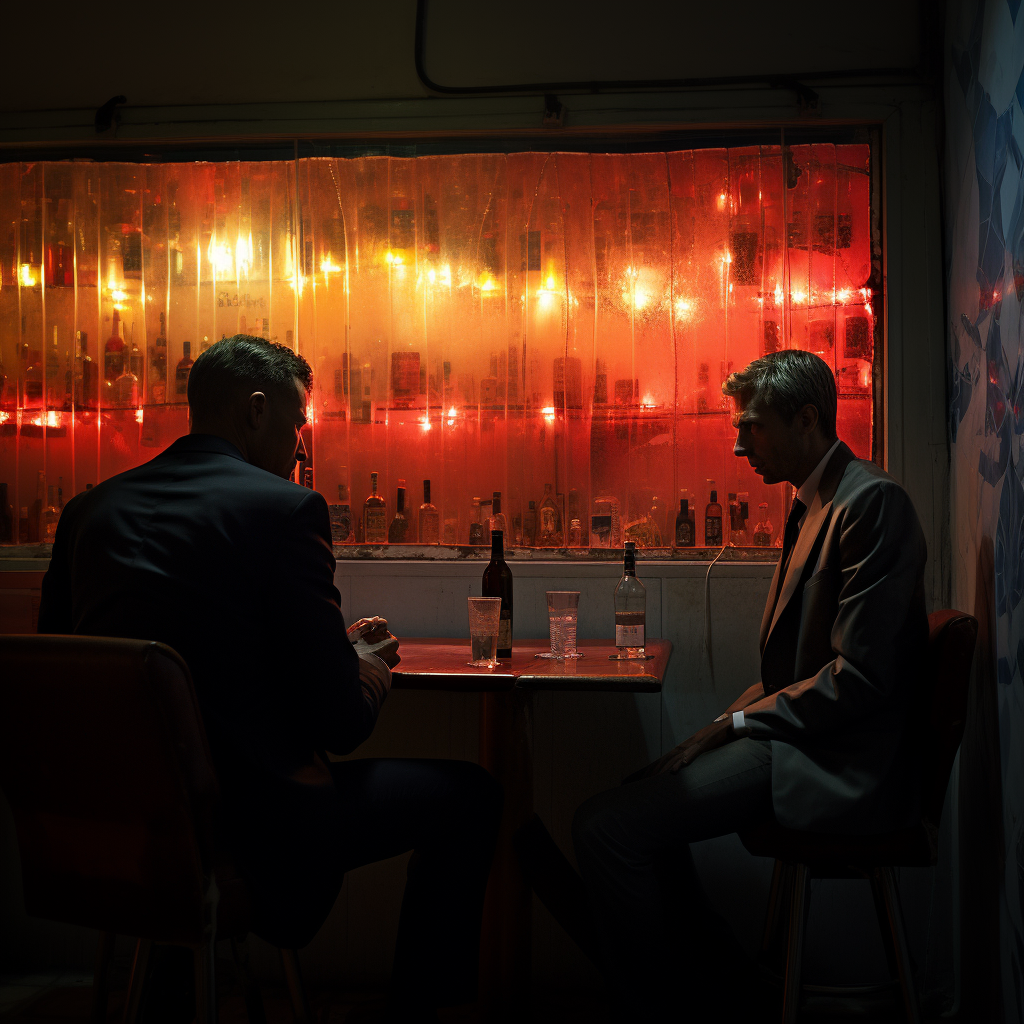
Uri knew he had to be cautious. Talking to an AI or a digital being about his quest would be the equivalent of broadcasting his intentions to the authorities. He had to find those genuine human moments, those spaces where real people sought solace away from the ever-watchful eyes of technology.
Bars were among the last bastions of humanity in this brave new world. Liquor, with its capacity to impair and alter human faculties, was of no use to digital entities. Therein lay Uri’s advantage. So, each evening, he’d frequent one of the older taverns or bars, places that still had worn wooden stools, dim yellow lighting, and where the air was thick with the murmur of conversation and the scent of aged wine.
He’d order a drink, always something strong, and then casually strike up conversations with patrons. “Remember the days of real meat?” he’d begin, watching their reactions closely. Many would laugh it off or look at him with genuine confusion, their memories perhaps too young to recall such times. But every now and then, he’d spot a flicker of recognition, a brief hesitation, or a cautious glance.
One evening, in a particularly ancient bar tucked away in Alfama, Lisbon’s oldest district, he met Raúl – an older man with deep-set eyes and a beard that spoke of many untold stories. Their conversation began casually, but as the night wore on and the liquid courage flowed, Uri’s questions became more pointed.
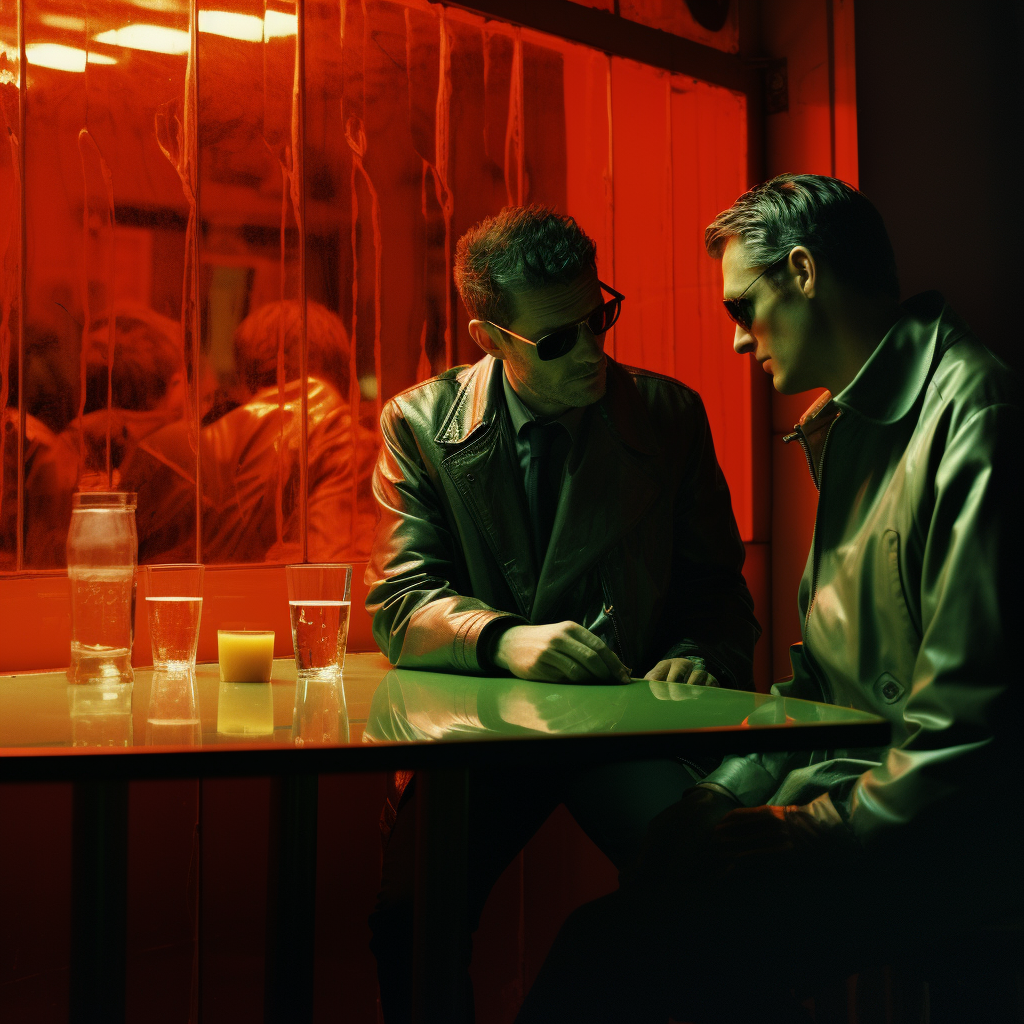
Raúl looked him straight in the eyes, his gaze unwavering, “You tread on dangerous ground, young man. Some legends are best left unexplored.”
But Uri was persistent. “I just want to taste it, once. Just to know what the fuss was all about.”
Raúl took a long sip of his drink, then with a heavy sigh, whispered, “Meet me here tomorrow, after sunset. But remember, this path you’re choosing might change you forever.”
The next day was a restless one for Uri. The blend of Lisbon’s beauty and the secrets it held was intoxicating. Every winding alley, every majestic view of the River Tagus, carried a heightened significance as the hours to sunset dwindled.
As evening approached, Uri made his way back to the bar in Alfama. Raúl was already there, a glass of red wine in hand, lost in thought. The bar was more subdued than the night before, the patrons fewer, the air thicker with anticipation — or maybe that was just Uri’s perception.
Taking a seat beside Raúl, Uri ordered a drink and waited. Minutes seemed like hours until Raúl finally broke the silence. “Before we delve deeper, you must understand something. What you seek is not merely about flavour or taste. It’s about rebellion, about seeking a connection to an Earth that many have forgotten. To taste real meat is to remember a time when life was raw, real and unfiltered.”
Uri nodded slowly, absorbing Raúl’s words. “I understand the risks. But this is something I have to do.”
Raúl studied Uri for a long moment before speaking. “Very well. There’s a place, not far from here. They don’t advertise, and they don’t entertain the idly curious. I can take you there, but once you’re inside, you’re on your own.”
The two men left the bar together, the ancient streets of Alfama enveloping them in a cocoon of shadows and whispers. They walked in silence, the weight of their shared secret pressing down on them. After what seemed like hours but was, in fact, mere minutes, Raúl stopped in front of an unassuming wooden door, barely visible between two old buildings.
“This is it,” he whispered, pressing a series of buttons on an ancient-looking keypad. The door creaked open, revealing a dimly lit staircase.
As Uri began to ascend, Raúl’s voice stopped him. “Remember, Uri. Some truths, once uncovered, can never be hidden again. Tread carefully.”
With a final nod, Uri stepped into the unknown, driven by a desire that transcended mere curiosity. He was about to embark on a culinary journey that would redefine his understanding of authenticity and heritage.
The staircase spiraled downwards, contrary to Uri’s expectations. As he descended, the modern hum of the city above seemed to fade, replaced by a hushed quietude that resonated with history. The walls, made of old stone, were cool to the touch, evoking images of secret gatherings from centuries past.
Finally, he reached the bottom, and a dimly lit corridor stretched out before him. Antique lamps cast a soft amber glow, illuminating intricate tapestries that depicted scenes of feasts and celebrations from a bygone era. A faint hum of conversation beckoned him forward.
Emerging into a large underground chamber, Uri was greeted by a scene that felt out of time. The room was alive with people – laughing, talking, and most importantly, eating. Long wooden tables were laden with dishes that appeared to defy the culinary conventions of the age. The rich aroma in the air was unfamiliar, tantalizing.
A server approached him, her eyes sharp and assessing. “You’re new,” she remarked, more a statement than a question. Before Uri could respond, she continued, “Follow me.”
She led him to a small table in a secluded corner, the relative privacy offering a panoramic view of the room. As he settled in, she handed him a leather-bound menu. “Our specials for the evening,” she said with a knowing smile.
The menu was concise, but what caught Uri’s eye was unmistakably clear: ‘Authentic Portuguese Steak – A relic of true taste.’ His heart raced. This was it.
He ordered without hesitation, and as he waited, he observed the patrons around him. Many faces were familiar, influential figures from the world of politics, business, and entertainment. All here, like him, in pursuit of a forbidden experience.
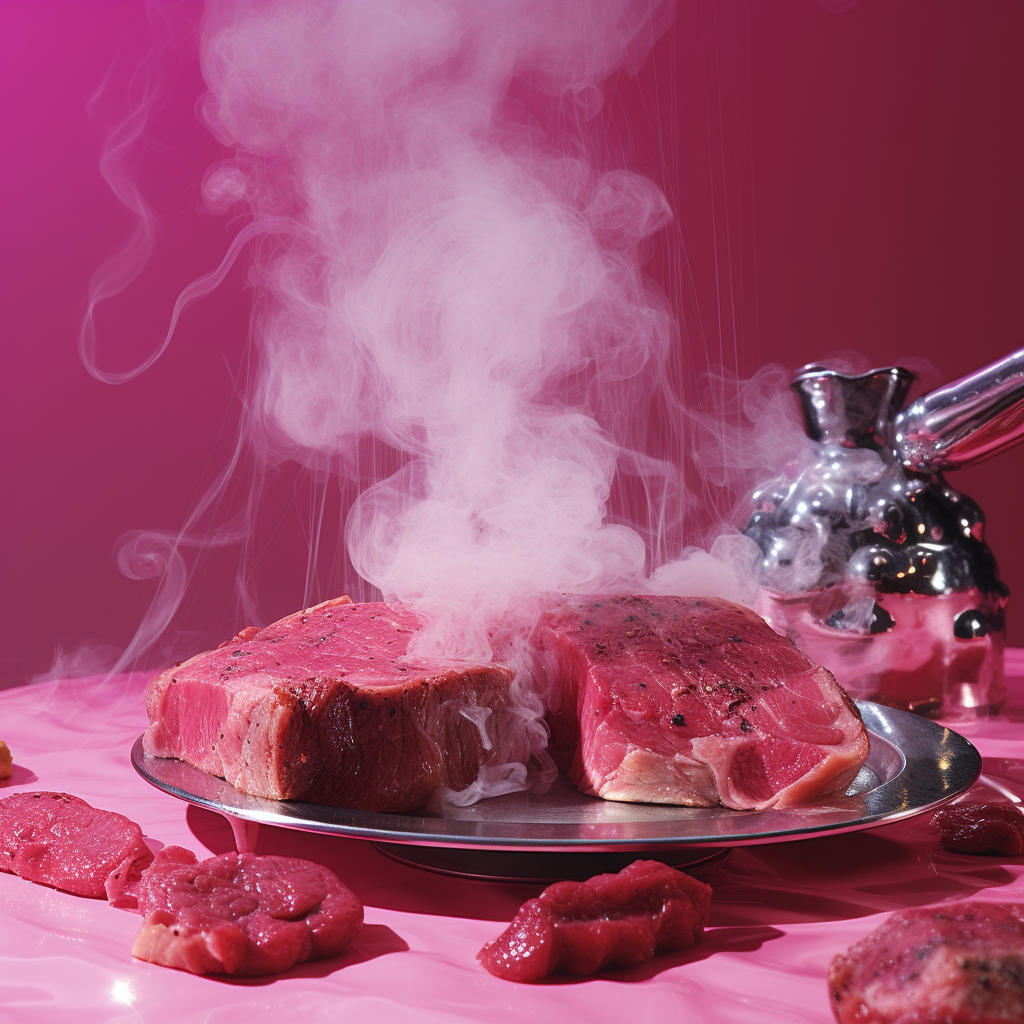
When the steak arrived, it was a masterpiece. Perfectly seared, with a rich, enticing aroma, it sat atop a bed of roasted vegetables. Uri hesitated for just a moment, taking in the sight, then took his first bite.
The flavours were profound, earthy, and genuine. Each bite was a journey back in time, reconnecting him with an ancestral palate that had been lost to progress. It was a sensation, an emotion, something visceral that 3D-printed alternatives could never replicate.
Seeing his reaction, a woman seated next to him remarked, “Incredible, isn’t it? Nothing like the fabricated rubbish they feed us.”
A waiter approached, and Uri, intoxicated by the taste, asked, “Where does this meat come from? How do you get it?”
The waiter leaned down, a conspiratorial grin on his face, “Good joke, sir.”
Uri’s eyes widened in surprise at the waiter’s cryptic response, but he decided not to press further on the matter. He leaned back in his chair, lost in his thoughts for another quarter of an hour, occasionally casting a wary glance around the room.
Eventually, signalling for the bill, he felt a small pit of anxiety forming in his stomach. It seemed an eternity, but after ten minutes, the waiter returned, his expression unreadable.
“We’re prepared for you, sir,” he said in an eerily calm voice.
“Prepared?” Uri queried, his eyebrows knitting in confusion. “I just want to settle my bill. Why can’t I pay here?”
The waiter responded, his tone hinting at a well-practised script, “No, sir. Here, you donate in our special room.”
Uri’s puzzlement deepened. “Donate? I’m not following.”
The waiter merely gestured for Uri to follow, and with growing trepidation, he did. Beyond a nondescript door was a scene Uri had not expected to encounter: a sterile, brightly lit surgical room, complete with an operating table at its centre. A figure, clad in surgical attire, stood beside it, arranging gleaming instruments.

Seeing Uri’s horror-stricken face, the surgeon offered what was meant to be a reassuring smile. “Relax, sir. We’ll only extract the equivalent of what you consumed. The process is quite painless. You might, however, feel a tad uncomfortable for a few days post-procedure.”
Uri’s voice trembled as he managed to utter, “Extract? What are you talking about?”
The waiter chimed in, his voice tinged with impatience, “Time is of the essence, sir. Our clientele await. You’ve indulged in your steak, and now, the cycle must continue.”
Before Uri could comprehend the implications fully, the waiter applied gentle pressure on his back, steering him towards the sinister gleam of the operating table.
As Uri approached the operating table with hesitant steps, the surgeon gently instructed, “Please lower your trousers, Sir. I assure you, it will be swift, and you won’t feel a thing.” And true to his word, Uri felt no pain. Moments later, he watched, horrified, as the surgeon passed a portion of his flesh to the eager hands of the waiter. With a satisfied nod, the waiter remarked, “Very lean and fine. We appreciate your contribution, Sir. This will be prepared medium-rare for the Prime Minister of Canada.”
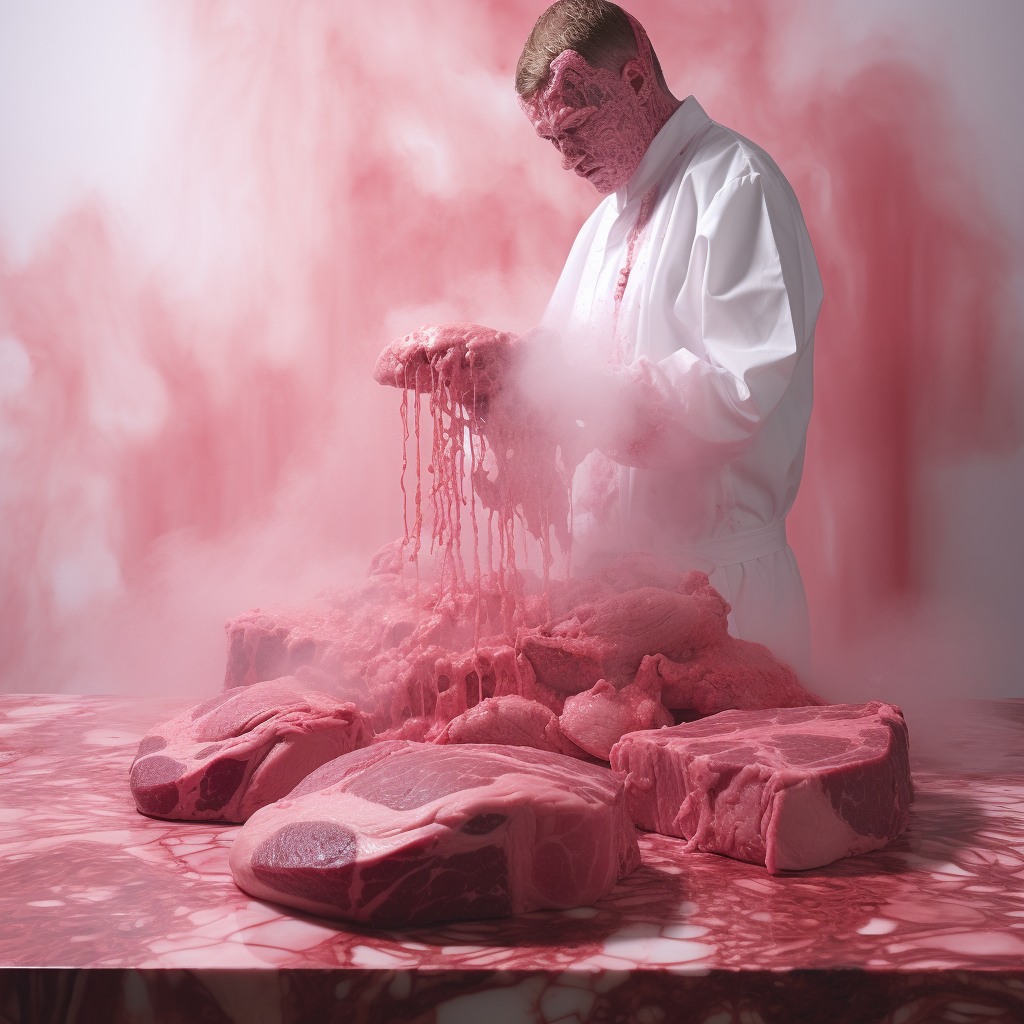
All images generated using Midjourney
